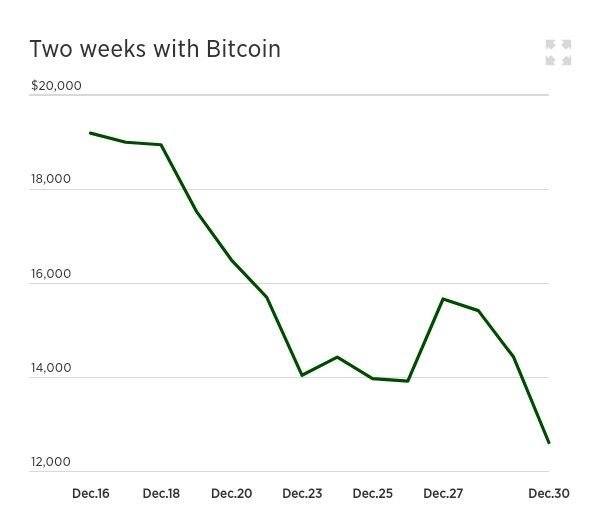Billionaire investor Warren Buffett says cryptocurrencies are headed for trouble.
"We'll never have a position in them," Buffett, chairman and CEO of Berkshire Hathaway, told CNBC's "Squawk Box" Wednesday morning. "I can say with almost certainty that they will come to a bad ending."
If those ominous words aren't enough to stress investors out, earlier this week, the popular cryptocurrency ripple plunged almost 13 percent and bitcoin shed nearly 8 percent of its value.
Owning an asset that's been called both a fraud and the future can be an emotionally intense experience.
When bitcoin lost 30 percent of its value on Dec. 22, for example, one post on Reddit read: "I just re-financed my house to get in. I'm freaking out." Another user offered support to the frantic: "If anyone's actually depressed or suicidal, come to r/SuicideWatch. We love to listen and talk there."
It's the 24-hour cycle of cryptocurrencies that can wear on people's nerves, said Jim Smigiel, CIO of absolute return strategies at SEI Investments Co.
"With other speculative investments, like private equity and venture capital, you can't check your phone every five minutes," he said. With cryptocurrencies, "You're able to track the minute-by-minute value of it."
"Looking at something with such high volatility all the time is not conducive to an investor's mental health," Smigiel said.
Here's how to keep calm on the cryptocurrency roller coaster:
Look away
Bitcoin's volatility is part of what makes it irresistible, said Willemien Kets, associate professor at the University of Oxford's Department of Economics.
"We know from social psychology that the best way to get people hooked on something is to give them a reward on a very uncertain time frame," Kets said.
Don't fall into the trap. Checking the value of cryptocurrencies constantly is unproductive, Kets said.
"You can't do anything about the price movement itself," she said.
Instead she recommends people decide on a price point at which they'll sell — say, if the asset drops below $10,000 — and set their phone to alert them at that threshold.
Jack Tatar, co-author of "Cryptoassets: The Innovative Investor's Guide to Bitcoin and Beyond," pointed to another reason why constant phone checks are futile.
"It's very hard to realize the gains you see on your phone," Tatar said. "These markets are not as liquid as the stocks and bond market. You can check your phone and see you're up to $30,000, but if you wan't to realize that gain, you probably won't be able to do that."
That's because it can take days for a cryptocurrency transaction to complete, during which the value can change substantially. Despite his advice, Tatar admitted he, too, can't look away.
"My son has tried to tell me to take a few days off," he said. "But I just can't."
Buy to hold
When people buy and sell in a dizzied cycle, they miss the bigger picture of cryptocurrencies and the blockchain technology on which it's traded, said financial advisor Ric Edelman, founder and executive chairman of Edelman Financial Services.
"There's no question that digital currencies are the future," Edelman said. "You should be prepared to own it for years."
He said his decision to hold bitcoin for more than a decade has paid off.
"I've watched it go from $1 to $1,000, back to $200 and then to $16,000," he said.
Although he acknowledged that such ups and downs are intolerable for some people.
"If owning this asset is causing you to stare at the ceiling at night, you shouldn't own it," he said. "There's more to life than money."
"I've watched it go from $1 to $1000, back to $200 and then to $16,000."
Peter Ayton, who studies behavioral decision theory at the City University of London, said it's hard to expect people to be rational with cryptocurrencies. Many people who've been seduced by bitcoin are individuals who might not fully understand what they're buying, he said.
"When you have something as volatile as bitcoin, it doesn't lend itself to long-term strategic thinking," Ayton said.
Source: www.cnbc.com
To be continued......